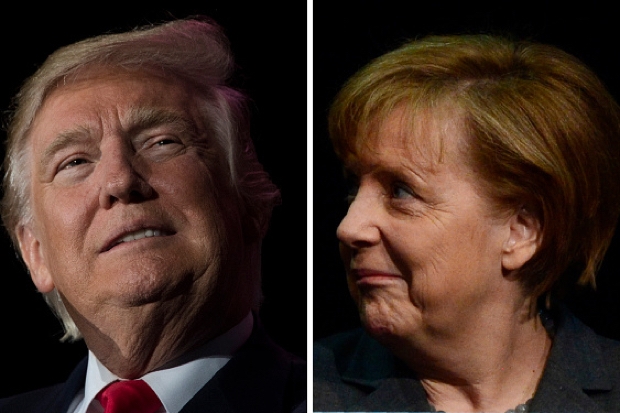Donald Trump’s Times interview has been a big story in Britain, but the President Elect’s parallel interview with Bild Zeitung (Europe’s largest circulation newspaper) has made an even bigger splash in Germany. Why so? Because Trump’s comments about Germany were a lot more pointed – and specific – than the pro-Brexit platitudes he tossed to Michael Gove.
Trump’s remarks about Merkel’s ‘catastrophic mistake’ of ‘letting all these illegals [sic] into the country’ hardly came as a surprise. After all, when Merkel won Time Magazine’s Person of the Year, Trump tweeted that ‘they picked the person who is ruining Germany.’ Yet until this week, there were still some Germans who thought he might rein in his anti-Merkel rhetoric.
For these optimistic souls, such robust language was a rude awakening. Trump’s description of Nato as ‘obsolete’ falls into the same category. It’s of a piece with what he’s already said (‘That’s really a problem that affects Europe a lot more than it affects us’ he tweeted, about Ukraine) but it’s still a shock for Germans to realise that the splenetic showman they saw on the campaign trail is the same man who’ll be sworn in as US President in a few days.
Even more disconcerting was Trump’s suggestion that Nato should be fighting terrorism, rather than deterring Russian incursions into Eastern Europe. Henning Riecke, head of the Transatlantic Relations Programme at the German Council on Foreign Relations (an independent think tank) called this ‘A profound misunderstanding of what Nato is and what it’s able to do.’ As Riecke told the German TV channel Deutsche Welle, ‘Nato isn’t designed to fight terrorism. Terrorism is not a problem that can primarily be combated with military means.’ The subtext is clear. Never mind what Trump wants. Does he actually have any idea of what Nato really does?
For Germans, however, the most significant revelations of this interview weren’t about Trump’s approach to foreign policy. Rather, the biggest scoop was his attitude to German car exports – largely based, it seems, on his limousine rides around Manhattan. ‘If you go down Fifth Avenue everyone has a Mercedes Benz in front of his house, isn’t that the case?’ he mused. ‘How many Chevrolets do you see in Germany? Not very many – maybe none at all.’ Bild asked Sigmar Gabriel, Germany’s Finance Minister, how America might redress this imbalance. Gabriel’s advice was succinct. ‘Build better cars.’
Bild asked Gabriel for a response to Trump’s complaints about BMW’s plans to build cars in Mexico (Trump mooted the idea of a 35% tariff on German cars crossing the border from Mexico into the US). Patiently, Gabriel pointed out that American and German car manufacturers aren’t completely separate entities – like so many global industries they’re intimately interconnected, which is what makes tariffs of any sort a lose-lose prospect for all concerned. ‘The US car industry would have a rude awakening if all the supply parts that aren’t being built in the US were to suddenly come with a 35% tariff,’ he said. ‘I believe it would make the US car industry weaker, worse and above all more expensive.’ Germans aren’t just concerned about which way Trump wants to steer the US juggernaut. They’re concerned about his ability to tell the difference between the clutch, the accelerator and the brake.
So where does this leave Germany? Well, at least forewarned is forearmed. For German exporters, the best hope seems to be the cooler heads of US Congressmen. ‘I would wait and see what Congress has to say about that,’ said Gabriel, of Trump’s threatened tariffs, ‘which is mostly full of people who want the opposite of Trump.’ And as for Merkel? As always, she’s happy to wait, and wait. ‘He has presented his positions once more,’ she said, on a visit to New Zealand. ‘They have been known for a while. My positions are also known.’ If Trump is the irresistible force, she’s the immovable object. Before The Donald’s unlikely victory she looked like a dead woman walking, but international relations have always been her strongest suit and Trump’s erratic attitude to Nato has restored her relationship with the German public. President Trump looks like bad news for Germany, and the rest of Europe, but, ironically, he’s given Chancellor Merkel a brand new lease of life.






Comments